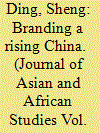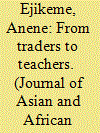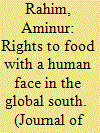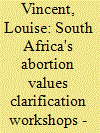|
|
|
Sort Order |
|
|
|
Items / Page
|
|
|
|
|
|
|
| Srl | Item |
| 1 |
ID:
106374


|
|
|
|
|
| Publication |
2011.
|
| Summary/Abstract |
In view of the challenge which higher education constitutes for most black South African students, this study focuses on study elements and aspects which black students regard as helpful and supportive. Our research question was: What do black students view as assets in their studies at tertiary institutions, specifically at the University of Pretoria? In their model of student development, Chickering and Reisser (1993) identified seven vectors which represent the main aspects of student development, as well as seven institutional influences on student development. We used this model to investigate how the learning assets which our participants identified could provide distinct guidelines for the provision of institutional support to students from disadvantaged backgrounds. A qualitative approach was followed where the 'photo voice' method (Olivier et al., 2009), combined with focus group discussions and narratives, was used to collect the data. Three themes emerged from our data. Students viewed their own study inspiration, the encouragement from within the university and from families and community, as well as a sense of physical security, as their main learning assets.
|
|
|
|
|
|
|
|
|
|
|
|
|
|
|
|
| 2 |
ID:
106375


|
|
|
|
|
| Publication |
2011.
|
| Summary/Abstract |
National image is not only a channel to wield a state's national power, but also an important national power resource. It has become critically important for China as it tries to rise in a relatively favorable international environment. Following a theoretical discussion on national image management in international relations and a historical review of China's national image management, this article examines China's strengths and weaknesses in its national image management. On the one hand, China's national image benefits from its strong commitment to cultural diplomacy, effective employment of information and communication technologies in international broadcasting, and close connections with the Chinese diaspora around the world. On the other hand, China's national image management is constrained by such hurdles as weak political credibility, reviving popular nationalism, and various missteps in its foreign policies. This study concludes that China's national image management will remain an uphill battle in the long run.
|
|
|
|
|
|
|
|
|
|
|
|
|
|
|
|
| 3 |
ID:
106370


|
|
|
|
|
| Publication |
2011.
|
| Summary/Abstract |
In Onitsha, an important commercial center in Nigeria, success as a merchant was the usual route for women who aspired to elite status in the period before the 1930s. In 1928, a school for girls was opened by the Holy Rosary Sisters, a Catholic order created especially by the bishop in charge of Onitsha Diocese. The opening of this convent school in Onitsha heralded a major transformation in the lives of Onitsha women, marking the transition between two epochs with regard to how women achieved elite status. From the mid-1930s a new class of elite women began to appear in Onitsha, all products of mission education; this transition from traders to teachers marks a major shift in the lives and roles of elite women. The colonial government contributed to this transformation with policies that undermined women's ascendancy in the market by placing men in leadership positions there.
|
|
|
|
|
|
|
|
|
|
|
|
|
|
|
|
| 4 |
ID:
106371


|
|
|
|
|
| Publication |
2011.
|
| Summary/Abstract |
This article seeks to dispel the popular myth surrounding the food crises which precipitated food riots in the global South in 2008. Arguing from a structural and historical perspective, the article suggests that global hunger is a deep-rooted crisis that is embedded in the social and structural variables associated within the nation-state that places a restraint on the self-regulating capacity of nation-states in the South. Internationalizing the food crisis, however, will do more harm to the south's agricultural transformation and rural development. The article argues for integrated rural development that will increase output growth through an institutional, technological, and marketing strategy.
|
|
|
|
|
|
|
|
|
|
|
|
|
|
|
|
| 5 |
ID:
106373


|
|
|
|
|
| Publication |
2011.
|
| Summary/Abstract |
A rich literature exists on local democracy and participation in South Africa. While the importance of participation is routinely built into the rhetoric of government, debate has increasingly focused on the dysfunctionality of participatory mechanisms and institutions in post-apartheid South Africa. Processes aimed ostensibly at empowering citizens, act in practice as instruments of social control, disempowerment and cooptation. The present article contributes to these debates by way of a critique of the approach used by the South African state, in partnership with the non-governmental sector, in what are called abortion 'values clarification' (VC) workshops. This article examines the workshop materials, methodology and pedagogical tools employed in South African abortion VC workshops which emanate from the organization Ipas - a global body working to enhance women's sexual and reproductive rights and to reduce abortion-related deaths and injuries. VC workshops represent an instance of a more general trend in which participation is seen as a tool for generating legitimacy and 'buy-in' for central state directives rather than as a means for genuinely deepening democratic communication. The manipulation of participation by elites may serve as a means to achieve socially desirable goals in the short term but the long-term outlook for a vibrant democracy invigorated by a knowledgeable, active and engaged citizenry that is accustomed to being required to exercise careful reflection and to its views being respected, is undermined. Alternative models of democratic communication, because they are based on the important democratic principles of inclusivity and equality, have the potential both to be more legitimate and more effective in overcoming difficult social challenges in ways that promote justice.
|
|
|
|
|
|
|
|
|
|
|
|
|
|
|
|
| 6 |
ID:
106372


|
|
|
|
|
| Publication |
2011.
|
| Summary/Abstract |
This article examines three approaches to the study of nations, nationalism, and ethnic identity: primordialism, instrumentalism, and constructivism. The discussion relies primarily on qualitative methods consisting of documentary and explanatory research to consider the strengths and weaknesses of each approach. More importantly, an attempt is made to understand Thai nationalism and ethnic identity. Applying each theoretical framework to explain the Thai nation, nationalism, and ethnic identity, this article finds that each approach has both pros and cons. This article thus proposes the mechanism of the political entrepreneur to discuss how Thai political leaders define and utilize Thai (or 'Thai-ness') as well as Thai nationalism.
|
|
|
|
|
|
|
|
|
|
|
|
|
|
|
|
|
|
|
|
|